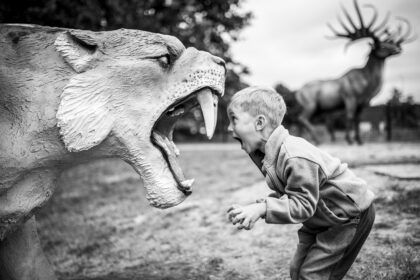Courage
Our theme for the month of October is Courage. I’m delighted that our Pride for All Ages group will be leading worship on October 23. For some of us, especially for people with marginalized identities, just existing in the world as our authentic selves requires courage.
Truth be told, all of us could probably exercise our courage muscles a little bit more. Especially as we commit to a big vision of dismantling racism and other oppressions in the service of building Beloved Community. Nurturing the world around us toward wholeness takes courage. Just nurturing our own lives toward wholeness can take some courage.
Part of the challenge is that our society labels some strange things as courageous. We see people dig in their heels, get in people’s faces, try to be the loudest thing in the room, or just act impulsively—and then get labeled as “courageous.” We may have to take a step back and consider what it really means to demonstrate courage.
One way we can do that is be being mindful of what we do when we’re fearful. When we aren’t being courageous, we have some predictable ways of being. We are often driven by our anxieties. By recognizing our reactive ways of being, we might more easily shift toward courage.
The good news is that there are only about four basic ways we react when we’re anxious. Sometimes we triangulate and try to offload our anxiety onto others. Sometimes we create conflict, even if it’s the soft conflict of persuading other people to see things our way. Sometimes we over-function and take on more than we can healthily do. And sometimes we just run away—we physically or emotionally distance ourselves from whatever makes us anxious.
Triangulation, conflict, over-functioning, and distancing. Those four habits keep us from being courageous. Those four ways that we react to anxiety keep us from living with full integrity to our deepest values. Being courageous might mean recognizing those habitual patterns and choosing a different path.
You’re probably already courageous in a lot of ways. But if you’re like me, you don’t have to think back very far to recall a time when you created conflict. Or emotionally shut down. Or took responsibility for fixing everything. Or complained to someone who had nothing to do with a situation. In other words, we’re human beings with some predictable ways of being human.
In the month of October, we’re going to explore all of those habits that we all bring into community with one another. And we’re going to identify what it might be like to display courage instead. What would it feel like to allow our guiding principles to more fully define how we respond in fearful moments?
That’s one of the benefits of being in a community where we’re committed to encouraging one another toward spiritual growth. We can be graceful as people grow into new behaviors, and we can learn how to be more courageous in a safe environment. And when we have the experience of being courageous with one another, maybe we find it easier to be courageous in other relationships, and in the larger community.
So, what if “being courageous” is just another way of saying living like our principles matter? If that feels a little scary or intimidating, just remember: None of us has to be courageous alone.
Share this post:
